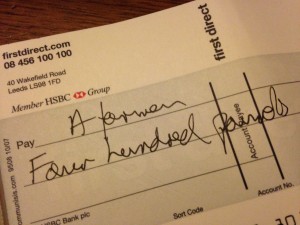 Although the NFU says that it has written to every MP on the subject of CAP reform they don’t put that letter (or those letters) on their website as far as I can see.
Although the NFU says that it has written to every MP on the subject of CAP reform they don’t put that letter (or those letters) on their website as far as I can see.
What they do say on their website is that they are ‘increasingly infuriated‘ with the government position. Only the farming industry would have the nerve to say that their competitiveness has to be underpinned by handouts from the taxes of freelance writers, nurses, refuse collectors, rural postmen and teachers. If we are looking at competitiveness then the efficient don’t need handouts and the inefficient shouldn’t get them!
There is a case for real income support for some types of farmers, but the current system gives most of the Pillar 1 money to people who don’t need it and shouldn’t get it. Of course, farmers don’t want to lose their handouts – who would? – that’s why they are sounding increasingly desperate.

And, none of this money disappears from farming. We taxpayers don’t get any money back if the Prime Minister backs Owen Paterson’s recommendation of 15% switch from handouts to environmental payments (although it isn’t quite that simple, but I’ll come back to that in a while, if I must). No, what we get is that warm glow of knowing that a small part of the CAP payment to farming is delivering a public good – a better environment – rather than topping up private income.
Neither major political ideology supports the current system. The Left (wherever they are these days) doesn’t approve of so much money going to the undeserving (as well as the deserving) and the Right just doesn’t like so much state intervention full stop. Only some farmers and their cronies (does that include David Cameron?) attempt even to defend a system which promotes inefficiency and unfairness all at once.
So if my MP, Andy Sawford, has received a letter from the NFU, I would just ask him to think how many of the inhabitants of central Corby would have sympathy for the NFU position?
![By Copyright by World Economic Forum, swiss-image.ch/Photo by Remy Steinegger. [CC-BY-SA-2.0 (http://creativecommons.org/licenses/by-sa/2.0)], via Wikimedia Commons](https://markavery.info/wp-content/uploads/2013/01/399px-David_Cameron_-_World_Economic_Forum_Annual_Meeting_Davos_2010-150x150.jpg)
Assuming that David Cameron isn’t already having a snooze – why not give him a nudge here.
[registration_form]
This is an important battle, sure, but I wonder if it isn’t the battle they want us to fight, while even more important changes are going on unopposed and unnoticed.
We were allowed to be consulted on this 15% while there were several restrictions afoot on the main subsidy-for-nothing 85%, to drive more of it into the hands of the NFU large-landowner-farmer brigade.
The first one is that only ‘proper’ farmers (ie NFU supporters) get the subsidy. You have to have derived a main part of your income/profit from ‘farming’, ie food production. This seems to rule out any land managed primarily for conservation. So are all conservation charities going to be deprived of their 85% direct payment now? If so I am surprised there hasn’t been more of a fuss made.
Another sneaky move is to remove any small-scale landowner from direct payments. Too expensive to administer says DEFRA, but are not small-scale farmers and growers usually more wildlife friendly, and precisely the ones we need to encourage for sustainable farming? Not according to the NFU whose members are, you guessed it, mainly large landowners. I’m surprised the various smallholder groups haven’t been complaining loudly about this. I know the amounts are small, but relative to their total income, maybe not. Of course many will also fail on the ‘proper farmer’ test if they have a job – say running a local post office – and an organic smallholding at the same time. Forget The Good Life – it’s The Bad Life of industrial farming that qualifies for direct payments.
And there is yet more – the NFU is opposing both the ‘greening’ measures proposed by the EU for payments and also, just in case, any external monitoring of these (‘certification’). Unlike the two above this one we were allowed to have a say on, so all is not lost.
What this has shown us, though, is how the NFU remains solidly, unremittingly and four-square against all environmental measures. Farmers are not like this. It is surely only a matter of time before the vast majority of farmers, who are not NFU members, find their own voice to counter this lunacy.
Jamie – many thanks. Good points. Yes, there are more battles to be fought if this one is won. I’m not sure it will be won. We should regroup when the battlefield looks clearer and we can count the bodies!
Apologies Mark – I’ve only just noticed you have already covered the greening issue!
Jamie – no worries.